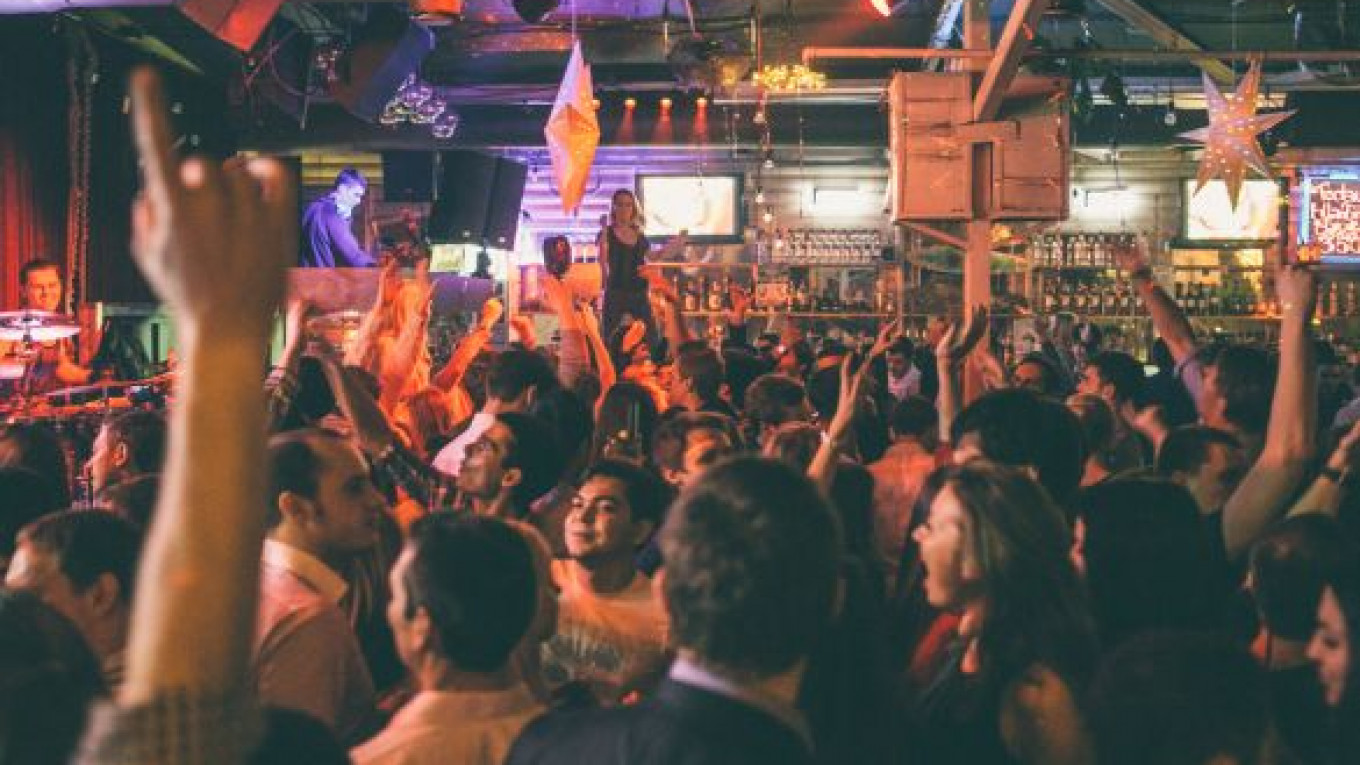Moscow has been regularly appearing on lists of the most expensive cities and for a good reason. Russian mentality assumes that while not everything expensive is necessarily good, everything good is definitely expensive. That's why people buy clothing at an exorbitant premium and pay ridiculous prices for cocktails. Scores of places have recently opened that are being promoted as "democratic," which in Russia means affordable, but they will still relieve you of most of the contents of your wallet.
But when in Moscow, party as Muscovites do. Going to posh bars and clubs is often essential to finding friends and fitting in. This doesn't necessarily mean spending all of your money in one night. Sometimes you see crowds of young people lounging at a glamorous place and you keep glancing at the prices chalked out on a blackboard and wondering how anyone can afford to get drunk in this place. Well, very few people actually can. It's all about preparation.
That's why our visit to Solyanka starts at the famous Cheburechnaya at Kitai-Gorod (1/4 Solyansky Tupik, +7 495-623-2868). We get lamb and beef chebureks — a curious cross between a meat pie and a dumpling — and chase them with vodka shots. All the prices are below 100 rubles. Our friend shows up with a small bottle of cranberry vodka infusion. We're told we can't drink our own alcohol at the Cheburechnaya and leave. There's a huge pile of snow practically blocking off one of the side-streets leading uphill from Ulitsa Solyanka, and that's where we set ourselves up.
By the time we line up for club Solyanka (11/6 Ulitsa Solyanka, +7 495-221-7557), we are pretty buzzed, but we still get in, no questions asked. There's a lot of people, but very few of them are dancing, and the music sounds a bit too experimental. I get a cocktail, which is surprisingly good, and sit down on a windowsill for a smoke. A heavyset guy with a crew cut, which is a very wrong look for Solyanka, asks whether he can bum a cigarette. He lights it up and suddenly launches into an exhaustive tirade about him serving in Chechnya during the second campaign. It takes me a while to get rid of him.
We get bored around 2 a.m. and take a cab to the Red October island. The place is bustling like it's lunch break on a weekday. Cars and people compete for the only narrow road that circles the island. We make our way to Rolling Stone Bar (3 Bolotnaya Naberezhnaya, +7 495-504-0932) through narrow alleys between looming red brick buildings of the former chocolate factory.
One of the most famous face-control-shchiks in the city, Philipp, is standing guard at the Rolling Stone. (Face control is a job particular to Moscow that combines elements of a bouncer and a hostess at an exclusive club.) One of our friends shouts, "Philipp, it's us!" Philipp waves us in, and we circumvent the line. There's a lounge bar downstairs, but everybody is climbing several flights of stairs to the main dance floor on the rooftop. Rather danceable chart music is playing, but the songs somehow seem too short; just when you start getting into them, they're abruptly over.
When I go to the toilet, I'm shocked by the longest line I've ever seen. There is a guard assigned specifically to keeping it in check. It's progressing so slowly that my bladder is about to burst. The experience is so excruciating that we decide to leave, tired but happy to have been a part of something glamorous.
If you are planning to party in style again next week, I recommend that you save money and wait for the metro to open at 5:30 in the morning. You can bide your time nearby at Starlite Diner (16/5 Bolotnaya Ploshchad, +7 495-951-5838), with its reliable American fare. You can splurge and go for a steak-and-eggs breakfast, or you can get some bite-size burgers, your choice. Either way, after breakfast, the chances of you falling asleep in the subway and getting robbed at the last station will be considerably lower. Trust me, I am speaking from experience.
Contact the author at artsreporter@imedia.ru
Related articles:
A Message from The Moscow Times:
Dear readers,
We are facing unprecedented challenges. Russia's Prosecutor General's Office has designated The Moscow Times as an "undesirable" organization, criminalizing our work and putting our staff at risk of prosecution. This follows our earlier unjust labeling as a "foreign agent."
These actions are direct attempts to silence independent journalism in Russia. The authorities claim our work "discredits the decisions of the Russian leadership." We see things differently: we strive to provide accurate, unbiased reporting on Russia.
We, the journalists of The Moscow Times, refuse to be silenced. But to continue our work, we need your help.
Your support, no matter how small, makes a world of difference. If you can, please support us monthly starting from just $2. It's quick to set up, and every contribution makes a significant impact.
By supporting The Moscow Times, you're defending open, independent journalism in the face of repression. Thank you for standing with us.
Remind me later.






